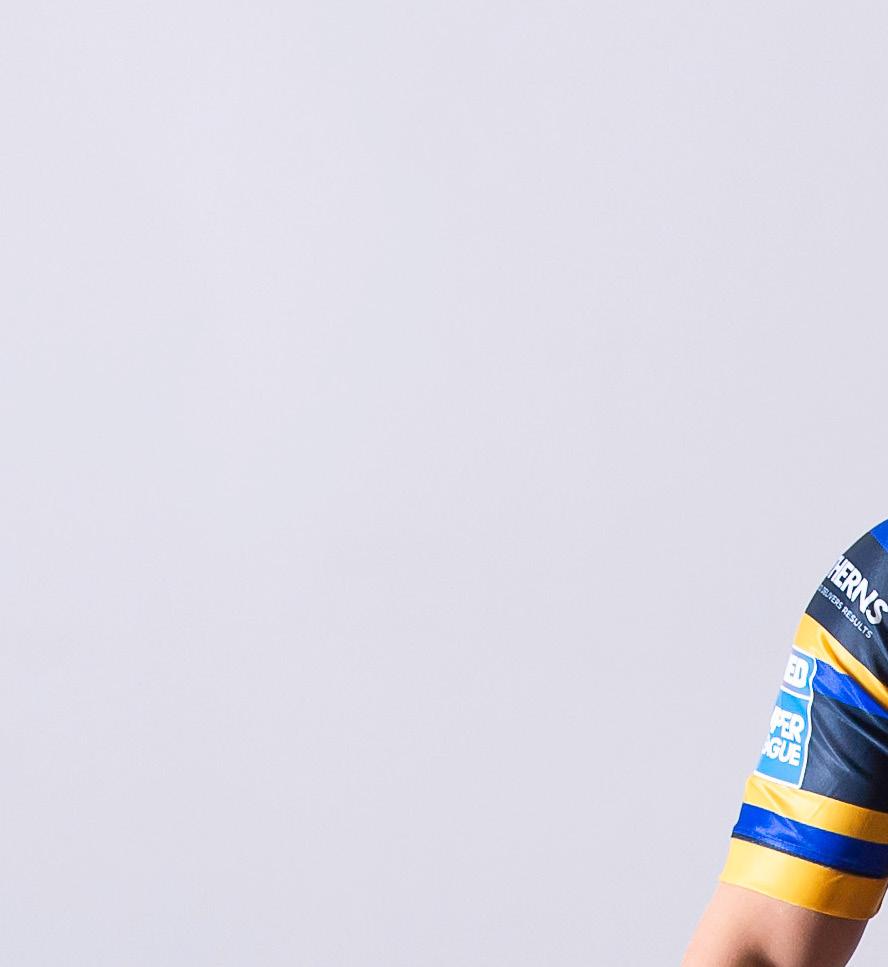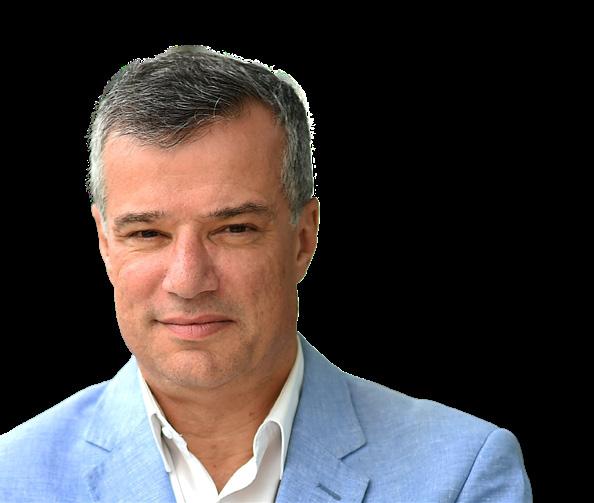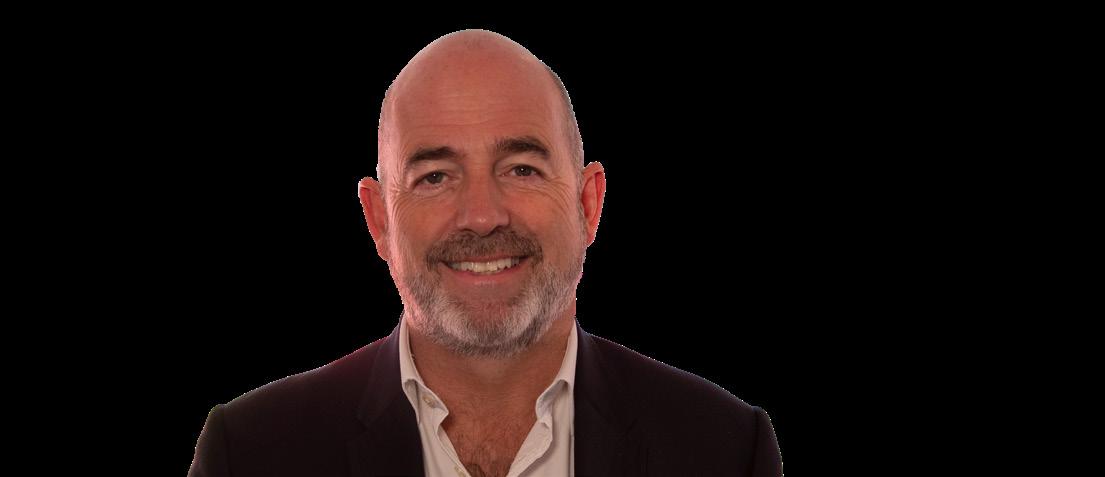
8 minute read
Moving society to a place beyond stigma
PLAYER CARE TEAM MANAGEMENT • PERSONAL DEVELOPMENT • ACADEMIES • COMMUNITY
STEVIE WARD CAPTAIN, LEEDS RHINOS
Advertisement
MOVING SOCIETY TO A PLACE BEYOND STIGMA
Stevie Ward, Leeds Rhinos’ Captain and founder of ‘Mantality’, speaks to Premier Sports Network on breaking into the professional game at a young age, managing setbacks, the importance of a strong support network and founding ‘Mantality’, the mental health support network that inspires the every-day male to become a more comprehensive version of themselves, with mindset being the first point of address.
Was it always your dream to play rugby professionally?
“I probably started playing at around the age of six and from as early as I can remember that was always the goal… I was probably about eight of nine when I seriously thought there’s a chance here.”
Stevie began playing rugby union for local side Morley, but having seen the route to professional level playing union was restricted through school level, he sought out Rugby League as his pathway to the very top where he would go on to be a multiple time league and cup winner with the Rhinos.
How were you noticed, and signed by Leeds Rhinos?
“The Rugby League set up is very much going to the amateur game and scouts go and watch it. After a bit of time at Morley until I was about 10, I went back to rugby league. In and around that you hear about scouts coming to watch the games and it’s very exciting for a young player.
“At 12 years old I joined the Leeds Rhinos scholarship, which is quite young. I can remember going in with my letter to school in year 7 saying that ‘you’re one of the 12 players on the squad sheet’ and I was buzzing. It was like all my Christmas’ come at once.”
Stevie then rose through the junior ranks at Leeds Rhinos. After an impressive first season with Rhinos’ under-18’s, Stevie made the step up to under-20’s whilst having the opportunity to train with the first team. Following a friendly against Featherstone Rovers in 2011 and his performances for the under-20’s he earned a place in Leeds Rhinos first team squad and was given his debut by Brian McDermott in 2012.
Ward, 26, is now Leeds’ longest serving player. He was a Grand Final winner in his first season and again in 2017, when he played the full 80 minutes against Castleford Tigers just eight days after suffering a dislocated shoulder, a final which Stevie describes as one of his career highlights.
What advice would you give for young athletes breaking into a professional set up?
“I had a real seamless trajectory at 18 years old, I remember picking up my A-level results and a few weeks after that I turned out at Wembley Stadium
Gary Bloom
Oxford United’s mindset master helps players conquer lockdown

PAGE 42
Brendan Flood
Education is vital to the future of the global sports industry

PAGE 46

Luke Cheyne
How the RPA are supporting Rugby’s elite with Gain Line

PAGE 54
starting in the Challenge Cup Final. We lost that final unfortunately, but a few months after that we won at Old Trafford – It went exactly as I would have scripted it.
“The first bit of adversity I got was at 19 where I dislocated my shoulder and damaged all the nerves down my arm. That was a big, big moment, because that was the moment where I would have to adapt, and things went a little bit different.
“To a young player, I would say when things don’t go right and take a bit of a turn the way you don’t want, you’ve got to be prepared to go with it and do everything you can in the situation you are in.
“You might have the tough rejection, you might have situations where you don’t fit in and a set up where you’re not quite excelling, but it is them moments that come that you weren’t prepared for, that is the biggest fire for your career. The best motivation is to prove people wrong. It’s all motivation to excel.
“Those moments where you’re on the back are the ones that will test you to go forward and be even better.”
How important is a strong support network as a young athlete?
“Those people inevitably make you who you are, the experiences that you have, the bits of help, [and] role models that show you which way to go.
“I think you need people who you can rely on and be honest with you too.
“You need to single those people out and be aware of who’s going to tell you if you’ve done well, but also what you could have done better and sense that they are doing it for you and not in any other fashion.
“It’s been such a strange time [during the coronavirus pandemic]. We’ve had bits of gym kit sent out to us; bikes sent out to keep active. I would say the club and Rugby League specifically have really progressed in mental health and how that is treated.
“There’s always someone there, we’ve got a Welfare Manager who is actually a trained counsellor, so he’s been massive over these last few months. People have got different things going on in life, different personal challenges. I think that the subject of mental health is so much easier to deal with now and so much easier to speak about, and I think the clubs doing a really great job in how they are handling stuff with what goes on, on and off the field.”
Mantality
Stevie launched his own brand ‘Mantality’ in 2016. After experiencing the ultimate highs of winning trophies but also the devastating lows which come with injuries, he chose to speak out about his own mental health. Through Mantality,


he dedicates his spare time away from the rugby field to move society to a place beyond stigma. A place where mental health can be spoken about openly and where relationships and passions can be cultivated, and overall performance improved.
The brand develops conversations through podcasts and articles, educates through workshops and carries its message with its own apparel. Podcasts have featured the likes of Callum Hancock, Matthew Lewis, Jamie Peacock, Lauren Steadman, Jason Fox and many more.
“At 19 I had a really big injury and I was out for the rest of the year. 2014 I came back and suffered that year because I wasn’t playing to the perception of how I knew I could play and I wasn’t playing to the perception of how others knew I could play and I was in and out of the team.
“2015 I was back competing; I was back on track.”
In 2016, Leeds Rhinos scored in the last second, which saw them move to the top of the league and ultimately win the Super League.
“I was in the changing rooms, because four minutes before the end I had ruptured my ACL and hobbled off the pitch. I was in the changing rooms as Leeds erupted, the stadium erupted, putting us back at the top of the table to win the second trophy out of three.
“I was looking at my knee; I didn’t know how to react or how to feel and I’m just thinking about that past episode in 2014 when I was in and out of the team and not part of it.”
To make things even more difficult, that day was the same day as his grandmother’s funeral.
“In that moment, I thought I’ve got to do something different because I can’t go back to that same mindset, I was in back in 2014.
“The idea and concept of mental health I grew up with; listening to music and seeing bits of art and mental health was always discussed in that arena, but when I was growing up in the sports related arena of rugby league it was silent and I didn’t get it. It was like the elephant in the room.”
Final bits of advice for young athletes:
“Make sure you take yourself away every now and again. I think as a young lad I was very serious and obsessed with everything in the game. I loved it so much and enjoyed it so much. When you’re getting a bit older and you’re 16, 17 just make sure you have time for yourself to take yourself away.
“One thing I would recommend massively is to try meditation out, that has been a massive thing for me especially with all the stress that’s gone on over the last couple of years and last few months for everyone.
“We run around a lot of the time hostage to our thoughts, pushed and pulled around [with sport], but [you need to] to take a bit of distance and time in the present moment where you can see these thoughts flying past your head, [and] once you get good at it you can understand why you might feel a certain way.”










